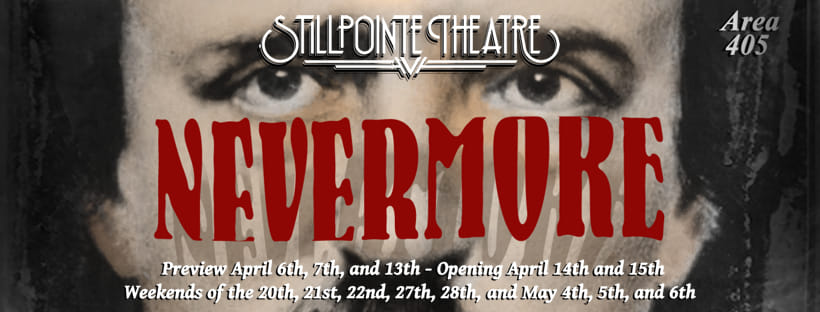Are you ready to sit in a theatre and see a play of hopes and fears? Stillpointe Theatre invites you to do exactly that. Examine the unexamined; explore the darkened recesses of the mind of the master of the macabre. They present to you the regional premiere of Nevermore, a 90-minute musical which swirls and swivels through the madness that is the mind of Edgar Allan Poe, Baltimore’s beloved poet. Directed by Ryan Haase, with Musical Direction by Ben Shaver, and Movement-Choreography by Amanda Rife, this wondrous strange and curiously intriguing piece of theatre will leave you puzzling and pondering, though perhaps just one fraction of a step closer to understanding the masterpiece of madness or maddening masterpiece that was the mind of Edgar Allan Poe.
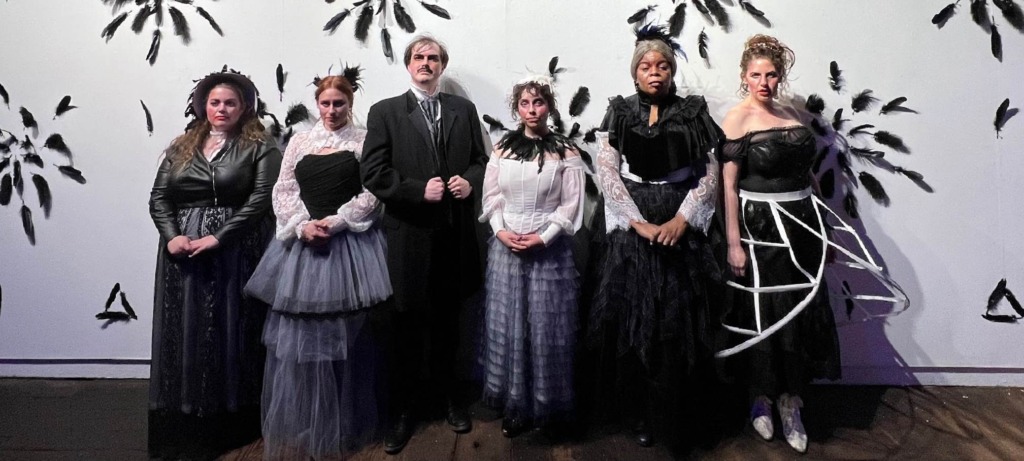
Matt Conner’s libretto will leave you with questions. The performances are stellar, fascinating too, loaded with emotional turmoil and nuance, filled with talent, but the libretto is— odd It’s like Nine meets Edgar Allan Poe but with six. The sole focus being the man himself and the women that plagued? Filled? Infested? Consumed? The five women who populated his life. All of them in simultaneous memory and real-time; its an intentionally dizzying confusion of delirium but not in the sense that you can’t follow along. What linear structure that Conner does include in the production is more of a guideline that gets warped and distorted by Poe himself and the entities— demons? Monsters? Shadows? Shades? Of the women of his past. Conner’s music, on the other hand, is haunting and serene, totally and effectively sublime. The way he sets “The Raven” to tune in the fashion that he does? Exquisite in a spine-tingling sense. And the lyrical dissonance that Conner plays with is equal parts impressive and innovative.
There is so much happening in this 90-minute whirlwind of beautiful chaos that the audience never had a moment to applaud; it all came at the end when Poe left the stage for the last time. Directed Ryan Haase an Musical Director Ben Shaver keeps this production sliding along, almost paralleling the speed at which Poe’s life began to decompose near it’s termination. Shaver, who is tucked away in the corner of the tennis-court-staging, conducts the live orchestra (with himself on keys, Naomi Schneller Zajic on violin, Allen Hicks on Viola, Billy Georg on secondary keys & percussion, and Kara Welch on Harp) delivers the eerie and utterly disturbing score with beautiful instrumentation. The music itself sounds wrong— the way an eerie moment in a horror film or a nightmare distorts itself against the ear and inside the mind so that you know something awful is about to happen? But it sounds beautifully wrong. Shaver meticulously guides the performers from his corner; the result is beyond impressive, particularly with some of those more disquieting harmonies when various voices come together over peculiar turns of phrase in these strange songs.
Haase’s vision for the show involves Edgard ever at the center and the shades of his past, present, and future— quite literally the five women who swirl about his conscious mind— are ever lingering around the periphery until they’re sucked in or ejected out. Laying the scene in the unique and historic warehouse/factory space of Area 405 gives Haase lots to play with; everyone expects anything related to Edgar Allan Poe to be a little creepy, a little edgy, a little unsettling and Haase does not disappoint. There are candles in bird cages strung aloft, and the sliding industrial door with its ominous lighting serves the dual purpose of entrances and exits but also the elusory notion of life in the before or the beyond. Note that Haase meticulously insures a pride of place for both Poe’s work and Poe’s drink upon the stage; the two things which without this performance simply could not accurately represent the master of the macabre.
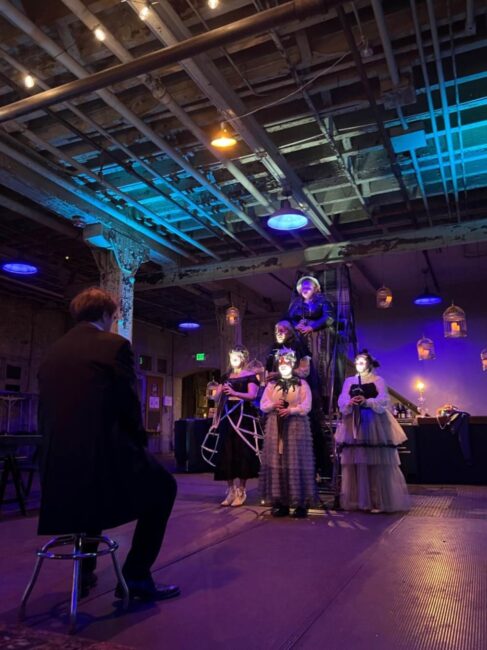
The unsung hero of the production team in the case is Stage Manager and Movement Coordinator Amanda Rife. There is an astonishing whirlwind of climactic chaos— bodies moving, objects flying, music happening, it’s wild. And the result of which is checker board pieces, playing cards, feathers, sheet music, writing papers, quills, and a menagerie of the like being scattered all over the stage. (Who do you think has to right it all back to its exact place come close of the production; shoutout to Rife!) The show’s movement is as intentional as the chaos of the libretto is wibbly-wobbly. There is a lot of circular movement, a lot of pacing the perimeter, and the aforementioned chaos scene which is a physical embodiment of the true delirium finally coming all the way unwound from inside Edgar’s mind, all of which is masterfully guided into existence by Rife. Well done.
Costumes (Kitt Crescenzo) and Makeup/Hair (Danielle Robinette) only further serve to entice the senses in this production. The show itself is visually impressive even if the libretto is a dizzying chaos around which one might struggle to wrap the mind. Crescenzo takes cues from the 19th century couture and fleshes it out appropriately for each of the five women featured in Poe’s life. And there are, of course, Raven feathers, in each of these costumes— though mostly on or in the hair or hats. It’s a nice symbolic touch. Robinette’s makeup work is praiseworthy, albeit frightening, which is what you hope for when you encounter any sort of Poe show. All of the women wear varying states of what can only be described as ‘masks of death’, some more subtle than others. Green and red sheens of mottled glitter, which look extra ghastly in those clever umbrella lights that are used to ghost-under-light the women throughout the performance, create the illusion that death or tragedy has all come to these women because of their involvement in Poe’s life. Sometimes it’s not noticeable; other times its all of their face you can see. It’s an impressive approach and delightfully unnerving.
As Director Ryan Haase says at the top of the show, “Poe was ick.” And he appropriately and graciously discusses potential trigger warnings included in the program. Intimacy Choreographer Katie Hileman does a remarkable job of choreographing these moments, with Poe and both ‘The Whore’ and ‘Virginia’, however unsavory they may appear.
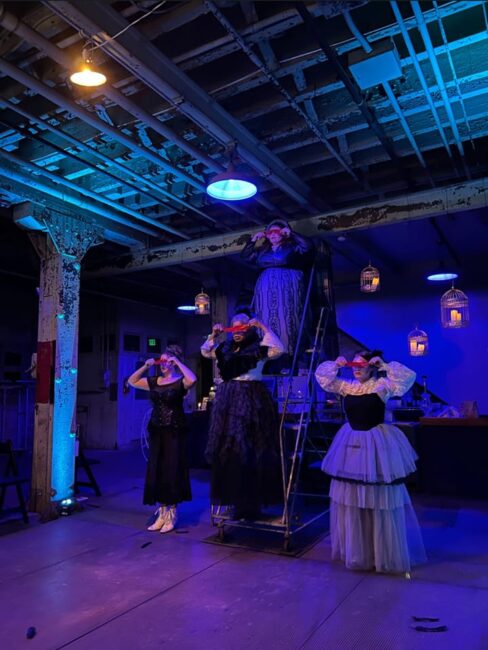
The five performing women— Caitlin Weaver as Virginia, Kay-Megan Washington as Muddy, Rachel Blank as The Whore, Kristen Zwobot as Mother, and Christine Demuth as Elmira— each have their own niche of Poe’s psyche into which they fit, some overlapping, some never crossing paths, all enmeshed in his madness. When their voices come together as one, this quintet of women is a powerhouse and force to be reckoned with and they each hold their own respectively either in solo moments of song or performance or when in duet with Edgar, or trio and group with the others. Kay-Megan Washington’s Muddy is the closest thing to the voice of level-headed reason inside of Edgar’s mind. Forced into his world by his relation with Virginia, Washington’s Muddy never quite succumbs to full envelopment and its fascinating to watch. Washington has a strong and beautiful voice that lends itself well to both the group numbers and the moments where she sings alone.
Kristen Zwobot, as Mother, has a shocking duality to her character. But it’s obvious to see that it is ‘Mother as he chooses to create her’ and ‘Mother as she was’. Zwobot’s character spends a great deal of time perched upon the elevated scaffold-ladder, not unlike Poe’s beloved Raven— perched and sat… ever observing with the kind, sorrowful eyes of regret and remorse. But when Zwobot is actively engaged with Poe— channeling the mother he perceived her to be— she’s pernicious, building her sniping barbs with each go-round. And her striking top soprano sears over the others in one of the group numbers near the end of the performance.
The Whore, played with harrowing sensuality by Rachel Blank, possesses a mesmeric voice that hypnotizes every time she takes up verse or chorus of “El Dorado.” While Blank embodies an essentially faceless, nameless character, she becomes all of the women of his past, his present, and future all at once. It’s astonishing. And the way she moves when addressing him— particularly after the death of Virginia— is fierce and fearsome. Blank’s body language is its own character on the stage, making you pay attention to her nameless, faceless, entity with every step she takes. Her voice is a songbird blend of something unsavory and yet enticing, forbidden fruit, if you will.
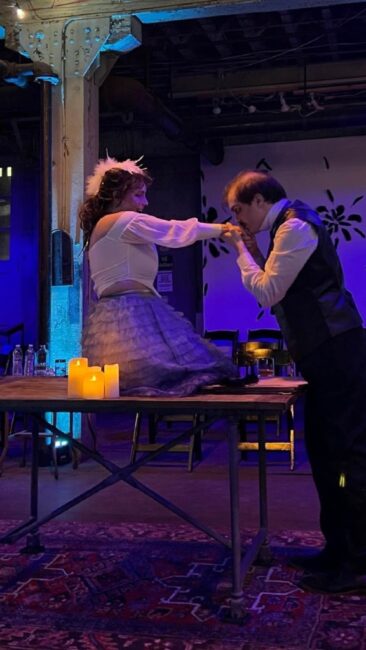
The dueling romantic interests— if you can call the characters of Virginia (Caitlin Weaver) and Elmira (Christine Demuth) that— are the epitome of youthful exuberance abound. When Demuth’s Elmira first encounters Edgar she’s possessed of a buoyant glee that often accompanies naivete in one’s youth. Similar can be said of Weaver’s Virginia, though hers is glossed with a veneer of giddiness that fizzles into those taboo and forbidden sensations that young girls of 13 are so often told not to discuss or think about. A great deal of the show’s interactions are Poe’s memories surrounding Virginia. Weaver does a terrifyingly impressive job embodying this character, particularly when Edgar first starts telling her his morose and morbid stories. Weaver physically transforms each spine-tingling terror, absorbing it through facial expressions and contortions of her limbs, from chills to thrill as they say. Both Demuth and Weaver bring extraordinary voices into the mix and while Weaver’s plight spirals out in true horror fashion, you get the sadder, wiser adult from Demuth’s Elmira near the show’s conclusion. And her vocal affectation to adjust from that gleeful girl to the widowed woman is as remarkable as her singing voice. Both women are two halves of Edgar’s heart and parts of his warped, twisted, and misguided soul.
Taking up the mantle of the iconic Edgar Allan Poe himself is Bobby Libby, who much like a haunted spirit finally returns to Baltimore to be seen on her boards once more. The madness Libby delivers as Poe is striking. The vocal versatility is astonishing. And his overall volatile nature, precariously balancing in his reality, ever afraid of succumbing to actual reality, is both a feat to be recognized and a force to be reckoned with. During the vocalization-song of “The Raven”, Libby blows you away, particularly when he hits the breaking point— it’s visually and vocally obvious— where madness rules his character entirely. While there is no slight southern hint of Poe’s wandering accent, Libby fits the bill in the historic-look-alike department and you can easily overlook this factor.

It’s as much a show about watching Poe as Poe watching those around him. In the moment where Mother (Zwobot) sings her almost maternal song of tragic memory, you can see Libby’s heart breaking through his body and across his face. This virile, animated, storyteller weaves a path of chaos and destruction through each character he entangles into his wandering web of darkened wonders. Even those moments when Washington’s Muddy pleads in earnest with him or speaks of how she refuses to fall into his world, you see the curious desperation painted all over Libby’s face; it’s fascinating. There comes a moment in the show, during and shortly after the musicality of “The Raven” where this whirling maelstrom of Blank, Demuth, Washington, Weaver, and Zwobot, collide in a cacophony of harmonies that are essentially his undoing; it’s the most powerfully staged moment I’ve seen and heard in quite some time.
The past may not be as interesting as Poe believes he can rewrite it to be. Nor is it as promising as he hopes to pen his future. The libretto may have made choices, but Stillpointe Theatre is producing this regional premiere, this rare bird, if you will, this ‘raven’ of darkness in musical theatre, and shedding illumination upon one of Charm City’s greatest historic treasure in the most fascinating way possible; through live theatre. It’s a chance well-worth taking, the performances alone will vibrate with you long into the night. Do not miss this rare glittering gem in the dark and unfathomable canon of ‘works that encompass Edgar Allan Poe.’ It will not linger forever at Charm City’s door… do not be fool and miss your chance to absorb this production of Nevermore.
Running Time: Approximately 90 minutes with no intermission
Nevermore plays through May 6th 2023 with Stillpointe Theatre currently at Area 405— 405 E. Oliver Street in Baltimore, MD. Tickets can be purchased at the door or in advance online.

